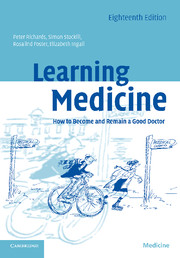Book contents
- Frontmatter
- Contents
- Foreword
- Preface
- 1 Why medicine and why not?
- 2 Opportunity and reality
- 3 Requirements for entry
- 4 Choosing a medical school
- 5 Application and selection
- 6 Interviews
- 7 Medical school: the early years
- 8 Medical school: the later years
- 9 Doubts
- 10 The new doctor
- 11 Developing your career
- 12 Career opportunities
- 13 Privileges and responsibilities: avoiding the pitfalls
- Postscript
- Appendices
- Index
2 - Opportunity and reality
Published online by Cambridge University Press: 02 December 2009
- Frontmatter
- Contents
- Foreword
- Preface
- 1 Why medicine and why not?
- 2 Opportunity and reality
- 3 Requirements for entry
- 4 Choosing a medical school
- 5 Application and selection
- 6 Interviews
- 7 Medical school: the early years
- 8 Medical school: the later years
- 9 Doubts
- 10 The new doctor
- 11 Developing your career
- 12 Career opportunities
- 13 Privileges and responsibilities: avoiding the pitfalls
- Postscript
- Appendices
- Index
Summary
Statistically, the chances of entry to medical school are pretty good: currently approximately 19,000 home, European Union (EU), and overseas applicants compete for nearly 8000 places to read medicine at UK universities. Since 2000, moves by the Government to increase the numbers of doctors in the NHS have prompted a surge of 2000 new places to read medicine in the UK.
In his report, Learning from Bristol (2001), Prof. Sir Ian Kennedy recommended that:
Access to medical schools should be widened to include people from diverse academic and socio-economic backgrounds. Those with qualifications in other areas of health care and those with educational background in subjects other than science, who have the ability and wish to, should have greater opportunities than is presently the case, to enter medical school.
In fact, most medical schools will consider applicants without a strong science background, especially for some graduate entry courses.
Most applicants come from professional or clerical backgrounds. Many others still see medicine as a closed shop in which, if you do not have such a background, you stand little chance of either entry or success. On the contrary, research has shown that once academic ability has been discounted neither social class, age, medical relatives, nor type of secondary school affect chances of entry to medical school. But examination results depend partly on educational opportunity at school, not to mention encouragement to study at home. Many medical schools try to take educational opportunity into account.
- Type
- Chapter
- Information
- Learning MedicineHow to Become and Remain a Good Doctor, pp. 13 - 26Publisher: Cambridge University PressPrint publication year: 2007


